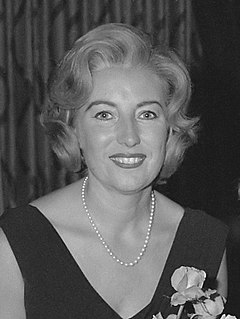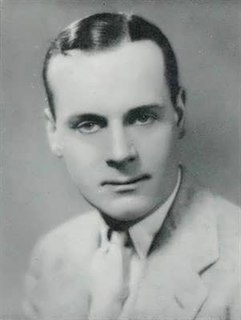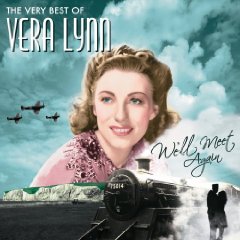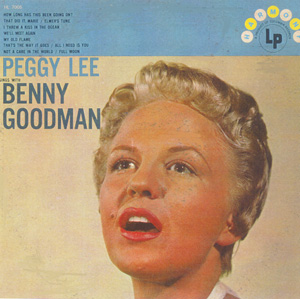Related Research Articles
"You'll Never Know" is a popular song with music written by Harry Warren and the lyrics by Mack Gordon. The song is based on a poem written by a young Oklahoma war bride named Dorothy Fern Norris.

"We'll Meet Again" is a 1939 British song made famous by singer Vera Lynn with music and lyrics composed and written by English songwriters Ross Parker and Hughie Charles. The song was published by Michael Ross Limited, whose directors included Louis Carris, Ross Parker and Norman Keen. Keen, an English pianist also collaborated with Parker and Hughie Charles on "We'll Meet Again" and many other songs published by the company, including "There'll Always Be an England" and "I'm In Love For The Last Time". The song is one of the most famous of the Second World War era, and resonated with soldiers going off to fight as well as their families and sweethearts.
"We'll Meet Again" is a 1939 song made famous by Vera Lynn.
"Vera" is a song by Pink Floyd which appears on their 1979 album, The Wall.
"Green, Green Grass of Home", written by Claude "Curly" Putman Jr. and first recorded by singer Johnny Darrell in 1965, is a country song made popular by Porter Wagoner the same year, when it reached No. 4 on the country chart. It was also recorded by Bobby Bare and by Jerry Lee Lewis, who included it in his album Country Songs for City Folks. Tom Jones learned the song from Lewis' version, and in 1966, he had a worldwide No. 1 hit with it.
"If You Were the Only Girl " is a popular song written by Nat D. Ayer with lyrics by Clifford Grey. It was written for the musical revue The Bing Boys Are Here, which premièred on 19 April 1916 at the Alhambra Theatre in Leicester Square, London. The song was originally performed as a duet between Lucius Bing, played by George Robey, and his love interest Emma, originated by Violet Loraine.
"I Had the Craziest Dream" is a popular song which was published in 1942. The music was written by Harry Warren, the lyrics by Mack Gordon.
"It's Easy to Remember " is a popular song written by Richard Rodgers with lyrics by Lorenz Hart, published in 1935, written for the 1935 film Mississippi starring Bing Crosby and W.C. Fields. Crosby introduced the song in the film and his recording for Decca Records made on February 21, 1935 with Georgie Stoll and his Orchestra and Rhythmettes and Three Shades of Blue topped the charts of the day. Crosby recorded the song again in 1954 for his album Bing: A Musical Autobiography.

We'll Meet Again is a 1943 British musical film directed by Philip Brandon and starring Vera Lynn. The plot is loosely based on the life of its star, otherwise known as Britain's "Forces' Sweetheart".

Dame Vera Margaret Lynn was an English singer, songwriter and entertainer whose musical recordings and performances were very popular during the Second World War. She was widely referred to as the "Forces' Sweetheart" and gave outdoor concerts for the troops in Egypt, India and Burma during the war as part of Entertainments National Service Association (ENSA). The songs most associated with her are "We'll Meet Again", "(There'll Be Bluebirds Over) The White Cliffs of Dover", "A Nightingale Sang in Berkeley Square" and "There'll Always Be an England".
"My Son, My Son" is a traditional popular music song written by Gordon Melville Rees, Bob Howard and Eddie Calvert in 1954. A recording of the song by Vera Lynn reached number one in the UK Singles Chart in November that year. It was Lynn's only UK number one hit on the official chart, a feat she achieved long after the period she became most associated with as the Forces' Sweetheart in World War II. However, there was no official singles sales chart in the UK at that time, so her recordings of songs which she has subsequently become more familiar with, such as her 1939 signature song, "We'll Meet Again", did not feature on any contemporary charts.

Ronald Ward was a British actor who, alongside his stage work, appeared in more than twenty British films between 1931 and 1956. He was born in Eastbourne in 1901 as Ronald William Ward, and made his screen debut in the 1931 film Alibi. One of his biggest roles was in the popular Vera Lynn vehicle We'll Meet Again (1943), where he was effectively the male lead, co-starring with Lynn and Patricia Roc.

We'll Meet Again: The Very Best of Vera Lynn is a compilation album by English singer Vera Lynn.

Peggy Lee Sings with Benny Goodman is a jazz album by Peggy Lee backed by Benny Goodman, released in 1957.
"When the Lights Go On Again " is a popular song composed during World War II. It was written by Bennie Benjamin, Sol Marcus and Eddie Seiler. The first recording, by Vaughn Monroe, reached number one on the charts in 1943.
"Where Are You?" is a popular song composed by Jimmy McHugh, with lyrics by Harold Adamson. The song was written for the 1937 film Top of the Town and was originally performed by Gertrude Niesen. Niesen also made a commercial recording of the song for Brunswick Records and this was popular.

"It's Always You" is a song written by Jimmy Van Heusen (music) and Johnny Burke (lyrics) for the 1941 film Road to Zanzibar. In the film it was sung by Bing Crosby to Dorothy Lamour as they paddled a canoe up a jungle river. It was also used briefly in a comedy scene in the film as a quasi-requiem for Lamour's character, who was erroneously thought to have been killed by a leopard.
"Don't You Remember When" is a song written by Lynsey de Paul and Barry Blue, that was released as a single by Vera Lynn on 20 February 1976 on the EMI record label, in the UK as well as in Europe. The song was recorded at the Marquee Studios, London and was produced by de Paul and she also sang backing vocals on the track. Ringo Starr, who was de Paul's boyfriend at the time, played the tambourine on the song, with Lynn recently recalling this in a 2019 interview in Saga Magazine. De Paul also produced the B-side of the single, "That Old Feeling", written by Lew Brown and Sammy Fain. The English keyboard player, pianist and composer Tony Hymas, who had worked with de Paul before on her Love Bomb album and who went on to be a member of the duo Ph.D., arranged the song. The song received favourable reviews, with the Record Mirror writing that the song is "a perfect vehicle for her with a well-honed nostalgic lyrics and lots of big long notes".

Her Greatest from Abbey Road is a 2017 compilation album by English singer Vera Lynn. Released on 10 March to mark her 100th birthday, the album, produced by Parlophone and Warner Music UK, compiles Lynn's recordings from Abbey Road Studios for the first time.
Irwin Louis Dash was an American songwriter, music publisher and pianist, who sometimes used the pseudonym Lewis Ilda.
References
- ↑ "We'll Meet Again Be Like The Kettle And Sing". The Bill Douglas Cinema Museum. Archived from the original on 2017-12-17.
- ↑ "45worlds.com". 45worlds.com. Retrieved March 2, 2019.
| This 1940s song-related article is a stub. You can help Wikipedia by expanding it. |